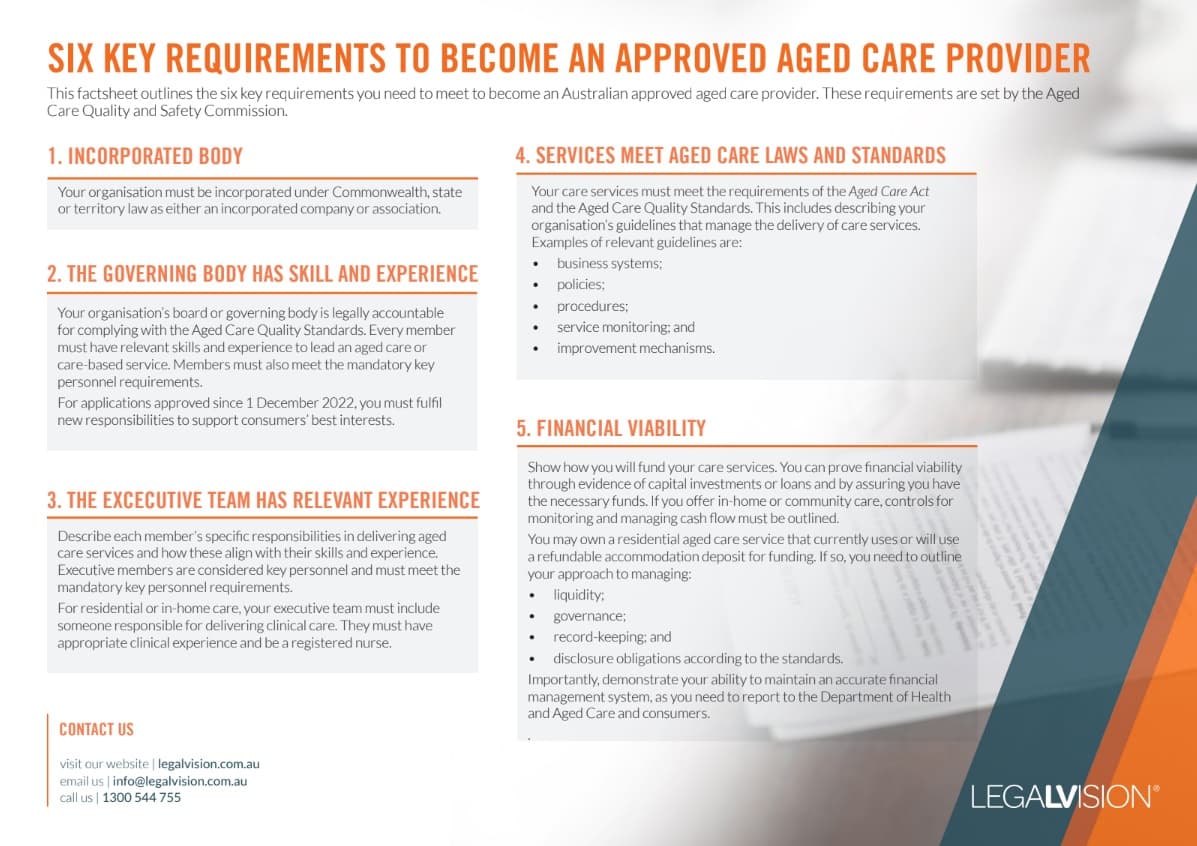One crucial aspect of delivering aged care services in Australia is ensuring that aged care providers have effective governance and leadership protocols in place to ensure the safety and quality of aged care services. The Aged Care and Other Legislation Amendment (Royal Commission Response) Act 2022 (Cth) introduced new requirements regarding ‘key personnel’. These changes aim to ensure that key personnel involved in providing aged care services in Australia are suitable. ‘Key personnel’ play an important role in your organisation and in ensuring the delivery of quality care and services to older people in Australia.
This article will explain who we consider as ‘key personnel’ and what responsibilities you have as an approved aged care provider regarding ‘key personnel’.
Who Are ‘Key Personnel’ in Aged Care?
‘Key personnel’ refers to individuals who have significant responsibilities and influence with an approved provider organisation. This includes:
- members of the governing body responsible for executive decisions, such as directors or board members;
- individuals with authority or significant influence over planning, directing, or controlling the organisation’s activities.
- employees or contractors responsible for providing nursing services who hold recognised nursing qualifications; and
- employees or contractors responsible for the day-to-day operations of the aged care service.
What Responsibilities Do I Have in Connection With My ‘Key Personnel’ as an Aged Care Provider?
‘Key Personnel’ Notification Requirements
Approved providers must notify the Aged Care Quality and Safety Commission (ACQSC) of any changes in circumstances to their key personnel that relate to their suitability to continue in their roles within 14 days of the approved provider becoming aware of the change. Approved providers should also notify the ACQSC of any changes in circumstances that materially affect their suitability to provide aged care services within 14 days of the change occurring.
Annual Suitability Assessments
Approved aged care providers need to assess their key personnel’s suitability for aged care provision every 12 months. You must determine if each key personnel member is suitable for their role and be “reasonably satisfied” with the assessment results.
To make this determination, providers should seek information directly from the key personnel and conduct their own inquiries. The suitability matters that must be considered include:
- experience in providing aged care or other relevant forms of care;
- any current or past NDIS banning orders;
- convictions for indictable offences at any time;
- imposition of civil penalty orders at any time;
- current or past insolvency or administration;
- adverse findings or enforcement actions by government bodies, commissions, or authorities (e.g., ASIC, ACCC, ACNC);
- findings or judgements related to fraud, misrepresentation, or dishonesty in administrative, civil, or criminal proceedings (including ongoing proceedings); and
- any disqualification from managing a corporation.
Record-Keeping Requirements
Approved providers must maintain records of the suitability matters considered for each of its ‘key personnel’ individuals. Generally speaking, these records must include:
- names of all key personnel;
- dates when suitability matters were considered;
- outcomes of the consideration of each suitability matter for each person; and
- reasons for the provider’s decision on each person’s suitability.

This factsheet will outline the six key requirements you need to meet to become an approved aged care provider in Australia. These requirements are set by the Aged Care Quality and Safety Commission.
Key Takeaways
As an approved aged care provider, you must identify all the ‘key personnel’ in your organisation. Every 12 months, you need to review these individuals, making sure they’re still suitable to provide care. You should be reasonably satisfied with the key personnel’s suitability and maintain proper records of these assessments. If there are any changes in circumstances impacting the suitability of ‘key personnel’, you, as an approved aged care provider, must notify the ACQSC within 14 days.
If you have any questions about ‘key personnel’ in aged care, our experienced aged care lawyers can assist in answering your questions as part of our LegalVision membership. For a low monthly fee, you will have unlimited access to lawyers to answer your questions and draft and review your documents. Call us today on 1300 544 755 or visit our membership page.
We appreciate your feedback – your submission has been successfully received.












